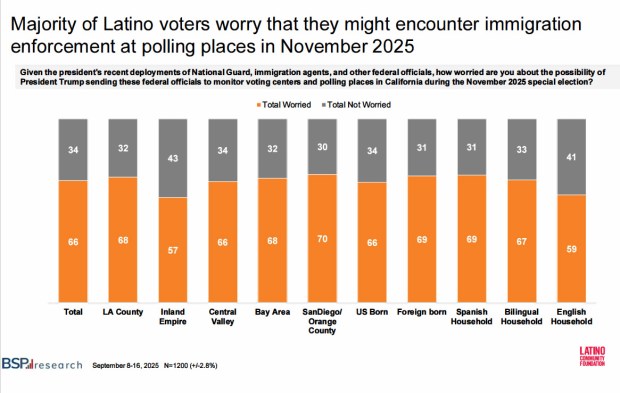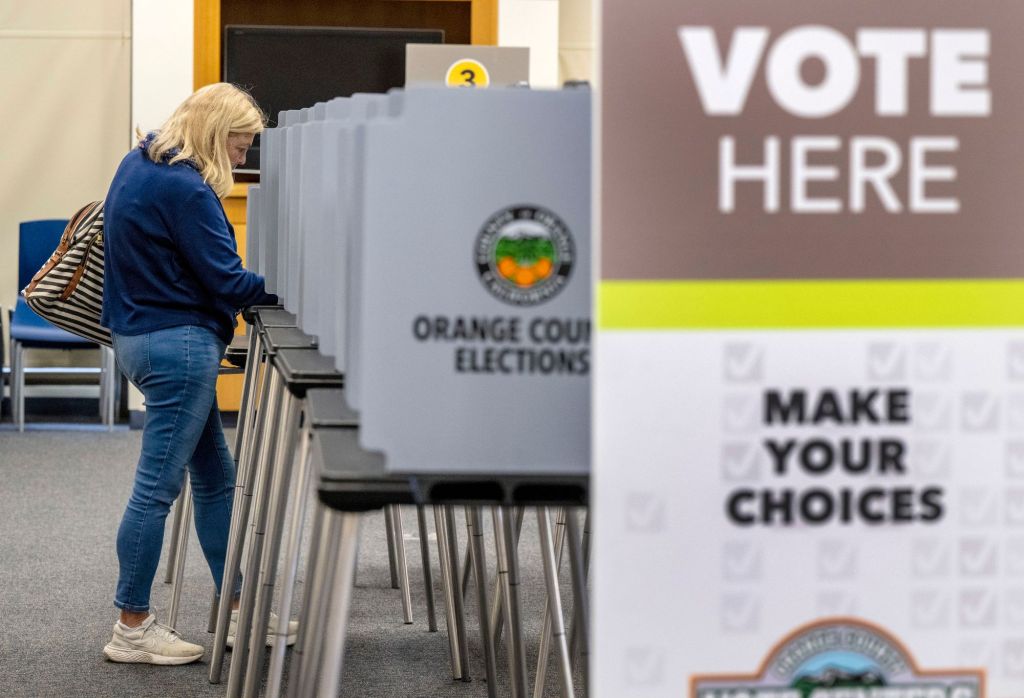With federal immigration agents continuing to roam neighborhoods in California, and multiple instances where U.S. citizens have alleged they were mistakenly or wrongfully detained, some voters say they have apprehension about casting their ballot in person during the special election on redistricting.
For Latinos and others whose communities have been targeted by U.S. Immigration and Customs Enforcement personnel in recent months, the fear of running into ICE agents — even if they are in the country legally — is real.
According to a poll commissioned by the California-based Latino Community Foundation, 66% of the 1,200 registered Latino voters in California who were surveyed last month expressed concern that they might encounter an immigration enforcement action at a polling location during the special election.
Some 66% of all U.S.-born Latino voters surveyed also expressed concern.
“These are Latino voters. By definition, they are American citizens who are concerned about these folks,” said Christian Arana, vice president of civic power and policy for the Latino Community Foundation.
 A poll commissioned by the Latino Community Foundation, and conducted in Sept. 2025, found that 66% of the 1,200 Latino voters in California surveyed were worried they might encounter federal immigration agents at voting locations during the state’s special election on redistricting. (Courtesy of Latino Community Foundation)
A poll commissioned by the Latino Community Foundation, and conducted in Sept. 2025, found that 66% of the 1,200 Latino voters in California surveyed were worried they might encounter federal immigration agents at voting locations during the state’s special election on redistricting. (Courtesy of Latino Community Foundation)
To be clear, state law prohibits voter intimidation.
Although a recent information bulletin issued by the California Attorney General’s Office did not specifically reference immigration enforcement, the document listed examples of voter intimidation, including “harassing or threatening behavior toward voters based on a person’s race (or) ethnicity” or “aggressively questioning voters about their citizenship.” Other examples included assaulting, threatening violence or being physically violent, brandishing a weapon or blocking the entrance or parking at a voting site.
“In the lead-up to the election and on Election Day, my office will be on call to provide assistance to the Secretary of State’s Office in enforcing California’s election laws, as needed, through a team of attorneys and administrative staff located across the state,” California Attorney General Rob Bonta recently said.
Secretary of State Shirley Weber, California’s top elections official, said during a call with reporters this week that there are plans to have law enforcement officers and others available to be deployed to a scene if necessary to ensure voting spaces are free of intimidation.
That said, Weber suggested that few undocumented individuals are expected to show up to voting locations in the first place.
“We don’t have undocumented individuals registered to vote. … So the likelihood of people who are undocumented going to a polling place to vote is really quite rare,” Weber said.
The U.S. Department of Homeland Security did not respond to a message about whether it intends to station federal immigration agents near voting locations.
But earlier in the week, DHS Assistant Secretary Tricia McLaughlin said in a statement that allegations that the department engages in racial profiling are “disgusting, reckless, and categorically FALSE.”
“What makes someone a target for immigration enforcement is if they are illegally in the U.S. — NOT their skin color, race, or ethnicity,” the statement read. “Under the Fourth Amendment of the U.S. Constitution, DHS law enforcement uses ‘reasonable suspicion’ to make arrests.”
The U.S. Department of Justice, meanwhile, announced on Friday, plans to send federal election observers to monitor the election in California as requested by the state’s Republican Party. It plans to monitor polling locations in five counties: L.A., Orange, Riverside, Kern and Fresno “to ensure transparency, ballot security, and compliance with federal law,” according to the DOJ.
Corrin Rankin, chair of the California Republican Party, wrote in a letter to the DOJ that there had been “reports of irregularities” in these five counties in recent elections.
As to whether federal immigration agents will be at or near voting places, Gov. Gavin Newsom told a local Fox reporter in August — after immigration agents stood guard outside the governor’s Prop. 50 kickoff rally in L.A. — that he believed it could happen.
“The issue of intimidation, which you saw today, I guarantee you that’s a preview in front of voting booths and polling places all across this country. That’s where ICE will be sent to intimidate and scare people,” Newsom said at the time.
Should that occur, some community members are wary that even U.S. citizens could be detained by ICE agents as they make their way to a vote center, despite federal officials’ insistence that their immigration agents do not engage in racial profiling.
In June, Andrea Velez, a U.S. citizen, was picked up as part of an immigration raid while on her way to work in downtown Los Angeles. (Federal officials alleged that Velez tried to block federal agents and impede their efforts during an immigration enforcement, an allegation that Velez denied.)
The following month, Army veteran George Retes, also a U.S. citizen, was arrested during an immigration raid at a Southern California marijuana farm.
Similar incidents have been reported in other states as well.
For people who do not want to go to a vote center, Weber noted that people have multiple options for casting their ballots.
Besides voting in person, a voter could drop off their completed ballot at a ballot drop box or a mailbox. (The Secretary of State’s Office recommends voting early if voting by mail. Due to U.S. Postal Service changes, in some parts of the state, ballots dropped off in mailboxes on Election Day won’t be guaranteed to be postmarked that same day. Instead, they might be postmarked the day after, which would be too late for the ballot to count.)
For voters who still wish to vote in person, local elections offices say they’re committed to ensuring that the upcoming election is carried out securely and free of intimidation.
SCNG’s Jeff Horseman and Kaitlyn Schallhorn, as well as The Associated Press, contributed to this report.
Originally Published: October 26, 2025 at 11:17 AM PDT
